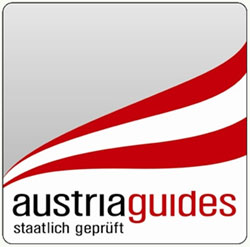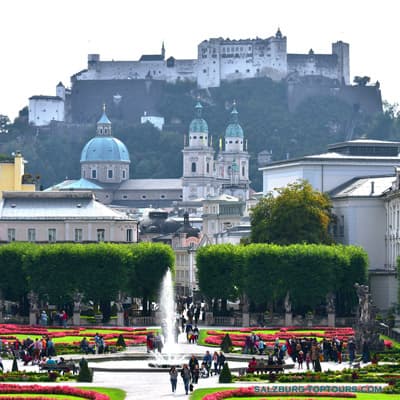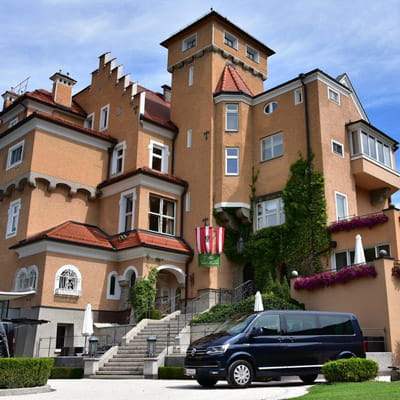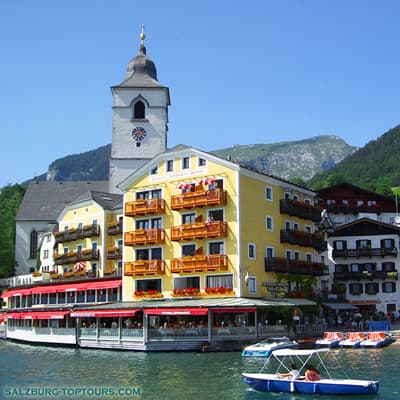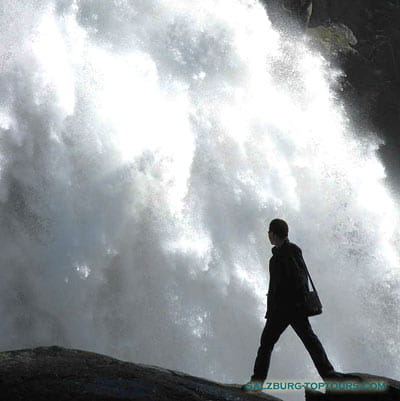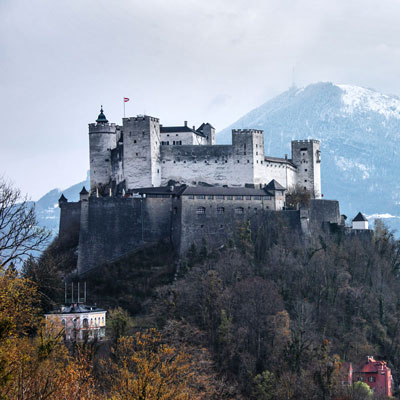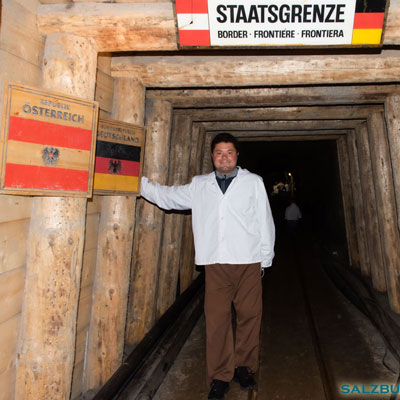Austria Holiday Calendar 2026 – Legal Public Holidays and Days Off
General Opening Hours
- Weekdays: Most shops operate from 08:00 to 19:00, while restaurants generally open from 11:00 to 21:00. During the summer music festivals in July and August, many restaurants extend their hours until midnight. Smaller cafés typically close by 20:00. Most establishments remain open throughout the day without a midday break.
- Saturday: A day off for students, office staff, and state employees. Stores usually operate on a reduced schedule, closing between 17:00 and 18:00.
- Sunday: Generally a day off, though tourist sites (museums, souvenir shops, and cafes) remain open. In Salzburg city center, specific grocery stores remain open:
- Billa (Old Town embankment): 11:00 – 15:00
- Spar (Mozart House): 14:00 – 18:00
- Spar (Central Railway Station): 09:00 – 22:00
- Seasonal Resorts: In ski resorts (December–April) and summer lake districts like Salzkammergut (June–September), grocery stores often open on Sundays from 09:00 to 13:00.
- Banks: Closed on Saturdays, Sundays, and public holidays. Currency exchange is typically only available on weekdays.
School Holiday Calendar (2026)
Austria operates on a two-semester system. Holiday dates vary by region:
Salzburg, Tirol, Burgenland, Carinthia, Vorarlberg:
- 07.02 - 15.02 (Semester break)
- 28.03 - 06.04 (Easter holidays)
- 23.05 - 25.05 (Pentecost)
- 11.07 - 13.09 (Summer holidays)
- 24.10 - 02.11 (Autumn holidays)
- 23.12 - 06.01 (Christmas and winter holidays)
Vienna, Lower Austria:
- 31.01 - 08.02 (Semester holidays)
- 28.03 - 06.04 (Easter holidays)
- 23.05 - 25.05 (Pentecost)
- 28.06 - 31.09 (Summer holidays)
- 24.10 - 02.11 (Autumn holidays)
- 23.12 - 06.01 (Christmas and winter holidays)
Upper Austria, Styria:
- 15.02 - 22.02 (Semester holidays)
- 28.03 - 06.04 (Easter holidays)
- 23.05 - 25.05 (Pentecost)
- 11.07 - 13.09 (Summer holidays)
- 24.10 - 02.11 (Autumn holidays)
- 23.12 - 06.01 (Christmas and winter holidays)
Public Holidays: Descriptions and Traditions
January 1 – New Year (Neujahr)
A day of rest and preparation for the working days ahead. In the heart of Salzburg, a New Year’s market offers delicious food and drinks, while various bands perform on stage at Kapitelplatz, presenting folk, classical, and jazz music.
Read more: New Year's Eve in the Old Town of Salzburg
- Status: Public Holiday
January 6 – Epiphany (Heilige Drei Könige)
A Catholic holiday is celebrated in honor of the Three Wise Men - Caspar, Melchior, and Balthazar - who brought gifts of gold, frankincense, and myrrh to the infant Jesus Christ. According to tradition, children divide into groups and perform carols on the Day of the Three Kings. Each group consists of three “kings,” symbolizing the three continents, races, and ages of humanity, along with a child carrying a Star of Bethlehem mounted on a pole.
These groups of carolers, known as Sternsänger, visit homes to sing Christmas carols and recite poems. It is customary for residents to make monetary donations to charitable causes. After a donation is made, the symbols C + M + B (Christus Mansionem Benedicat), meaning “Christ, bless this house,” are written in blessed chalk above the door of the house or apartment.
- Status: Public Holiday
April 5 & 6 – Easter Sunday & Monday (Ostern)
Easter is the most important holiday in the Christian calendar. On Easter Eve, churches light the Easter fire or candles to symbolize rebirth and new beginnings. During the festive service, lamb-shaped cakes, cheeses, sausages, and eggs are blessed. It is customary to share these consecrated foods with loved ones and enjoy a family breakfast together. People also weave and bless Easter palms (palm branches), which are later carried in magnificent Palm Sunday processions.
Read more: Austria Easter Customs
- Status: Public Holiday
May 1 – Labor Day (Staatsfeiertag)
Labor Day celebrates workers’ solidarity and social justice. In Austria, May 1 also marks the beginning of the agricultural season; in rural areas, it is customary to erect a maypole, a symbol of fertility.
Read more: Maypole Raising
- Status: Public Holiday
May 14 – Ascension Day (Christi Himmelfahrt)
Ascension Day commemorates Jesus Christ’s return to his Father in the Kingdom of Heaven, forty days after the Resurrection (Easter). It is customary for parishes to celebrate the rite of First Communion for children on this day.
- Status: Public Holiday
May 24 & 25 – Pentecost Sunday & Monday (Pfingsten)
The celebration of the founding of the Christian Church is marked by a festive procession in which doves are released, symbolizing the Holy Spirit’s descent upon the apostles. On this day, church parishes typically hold confirmation ceremonies, one of the seven sacraments of the Catholic Church.
- Status: Public Holiday
June 4 – Corpus Christi (Fronleichnam)
The holiday dates back to the 13th century and originates from a vision experienced by Julianna of Liège, a nun from the Augustinian convent. According to legend, she saw the church as a disk of the moon with a dark spot, which she interpreted as a sign of insufficient reverence for the Eucharist - the sacred transformation of Christ's blood into wine and flesh into bread. During the Frontline Holiday, churches are adorned with flowers and young birch trees. Following the service, a solemn procession winds through the streets, led by children and young people carrying Bibles and crucifixes. Honorary citizens hold a canopy—a symbol of heaven—beneath which a priest walks, carrying a monstrance containing a special consecrated bread representing the flesh of Christ. Musicians and local residents bring up the rear, completing the reverent procession.
- Status: Public Holiday
August 15 – Assumption of the Virgin Mary (Mariä Himmelfahrt)
The Assumption of the Virgin Mary, in which her body and soul are taken to heaven, is commemorated with the blessing of medicinal herbs, decoctions, and root-based healing ointments. It is also customary to hold processions reminiscent of Christ's body and blood.
- Status: Public Holiday
October 26 – National Day (Nationalfeiertag)
Commemorating the 1955 withdrawal of Allied troops and the declaration of Austria’s permanent neutrality, October 26th is celebrated as a national holiday. On this day, Allied and Soviet forces left Austrian territory following World War II, marking the establishment of the country’s new democratic principles and its commitment to eternal neutrality. In many cities, especially in Vienna, government offices open their doors to the public, allowing visitors to explore official buildings from the inside. Themed excursions and special events are also organized to celebrate this historic day.
- Status: Public Holiday
November 1 – All Saints' Day (Allerheiligen)
November 1 is a day of remembrance honoring all Christian saints and martyrs. Its origins date back to the 7th century, when the Pantheon - a temple dedicated initially to pagan gods - was converted into a church in honor of the Virgin Mary. The evening before, known as Halloween, is widely celebrated, particularly by young people attending nightclubs, while children go trick-or-treating at home, saying "trick or treat" (Süßes oder Saures) to collect candy. November 2, called All Souls’ Day, is devoted to commemorating all Christian martyrs who died for their faith. Together, November 1 and 2 are sometimes observed as Parents’ Day. During this period, people typically hold memorial ceremonies in cemeteries, lighting candles at monuments and decorating graves with traditional autumn flowers such as yew, boxwood, and mistletoe.
- Status: Public Holiday (Note: On Nov 2, All Souls' Day, students and civil servants have the day off, but businesses remain open.)
December 8 – Immaculate Conception (Mariä Empfängnis)
A Catholic feast celebrating the dogma of the Immaculate Conception: Mary, who was free from the original sin inherited from her parents, Anne and Joachim, was predestined to become the mother of Jesus Christ, the Son of God.
- Status: Public Holiday (Unique note: Despite being a holiday, most shops remain open for Christmas shopping.)
December 24 – Christmas Eve (Heiliger Abend)
In church tradition, Holy Night, also known as Christmas Eve, has been celebrated since the 6th century to heighten anticipation for the birth of Christ. On this day, people complete the final preparations for the holiday, including placing gifts under the Christmas tree, setting up a small stable with the Christ child in a manger, and hanging angelic images called Christkindl throughout the home. Although Christmas Eve was historically a day of fasting, modern celebrations are no longer limited to abstaining from food. Traditional dishes such as roast goose, turkey, fish, or boiled beef (Tafelspitz) are commonly served, accompanied by hot wine and punch. Believers typically attend church services by 23:00, and at midnight, the arrival of the Messiah is celebrated with the ringing of bells. It is also customary to give to charity on this day.
- Status: Half-day schedule: Shops and malls close early, usually by 13:00, while the Christmas market remains open until 15:00.
December 25 – Christmas Day (Weihnachten)
In the 4th century, Pope Gregory designated December 25th as the birth date of Jesus Christ, as the Bible does not provide an exact date. Today, Christmas is a time for families to come together. Some prefer a relaxed day, enjoying photo albums, watching favorite movies, or taking a stroll, while others embrace outdoor activities such as skiing, sledding, or ice skating. Attending a church service remains an important tradition, often followed by the exchange of gifts.
If you find yourself in Salzburg, the Christmas Market in the city center is open until 18:00 on December 25 and 26. Most shops and restaurants are closed.
Read more: Christmas Traditions and Events in Salzburg
- Status: Public Holiday
December 26 – St. Stephen's Day (Stefanitag)
The Day of St. Stephen (Stepan), the first Christian martyr, is celebrated on December 26. For most Austrians, however, it is simply the second day of the Christmas holiday. Traditionally, people use this day to visit distant relatives and friends. In many villages and towns, horse races known as Stefaniritt are also held, after which priests bless both the riders and their horses.
- Status: Public Holiday
December 31 – New Year's Eve (Silvester)
Until the seventeenth century, European countries marked the beginning and end of the calendar year on different dates. It was not until 1691, when Pope Innocent XII established a standard, that December 31 officially became the last day of the year and January 1 the first. Prior to this calendar reform in the Holy Roman Empire, the year ended on December 24, began on January 6, and the intervening period was known as Zwischen den Jahren (“Between the years”). In many countries, December 31 is still called Silvester, in memory of Pope Sylvester I, who died in 335. In Salzburg, the New Year is celebrated with a city-organized fireworks display, though in many Austrian towns, pyrotechnics have been replaced with environmentally friendly laser shows. It is also customary for friends and family to exchange small symbolic charms for good luck, such as marzipan pigs, toy chimney sweeps, and horseshoes inscribed with well-wishes.
Read more: New Year's Eve in the Old Town of Salzburg
- Status: Shops close early (typically by 13:00).
Tags: Helpful tips for planning your trip to Austria and Salzburg
